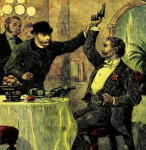
 People today are inclined to believe of boycotts as classic non-violent immediate action. Electric power to the men and women! and so on. Normally, in latest a long time, boycotts have been utilized by customers to tension organizations on a vary of progressive problems, these as gun control and relationship equality.
People today are inclined to believe of boycotts as classic non-violent immediate action. Electric power to the men and women! and so on. Normally, in latest a long time, boycotts have been utilized by customers to tension organizations on a vary of progressive problems, these as gun control and relationship equality.
But of class, boycotts have not generally been a progressive factor — they’re utilized by activists on all parts of the political spectrum. And traditionally, they’ve at times been used for some alternatively terrible applications. In the 1920s, for case in point, the Ku Klux Klan quite overtly utilised boycotts to travel Black-owned shops (together with suppliers owned by Jews and Catholics) out of organization. This was a tactic aimed eventually at driving out full minority populations out of unique towns and states.
Kathleen Blee, in her reserve Gals of the Klan: Racism and Gender in the 1920s, notes with evident shock that between the informants (former Klan associates) she interviewed, “None saw [such use of economic power] as an act of violence.” Linda Gordon, in her have e-book, The Second Coming of the KKK: The Ku Klux Klan of the 1920s and the American Political Custom, cites Blee on this point. Equally authors, appear to come across this impressive, implying that they (these authors) do see Klan boycotts as a sort of violence. I’m tempted to agree with them.
But hold out, shouldn’t we distinguish boycotts from the genuinely violent behaviours engaged in by the KKK? Isn’t “violence” listed here just a metaphor?
It’s possible. But it is worth noting that financial harms are genuine harms. Financial losses can suggest the incapability to try to eat, or to feed your relatives. The proprietor and staff of a Catholic-owned business enterprise in a little city in Indiana in the 1920s may possibly have endured quite actual hardship if the Klan convinced a adequate proportion of the town’s populace not to shop there, as they often did. I suspect lots of men and women would, if pressed, favor to experience some evaluate of literal, actual physical violence (a black eye? a average beating? a several damaged home windows?) to the kind of economic decline such boycotts implied. Economic harms are significant.
Granted, not all circumstances are so spectacular: when Democrats in the US boycotted In-N-Out Burger in 2018 for donating to the Republican occasion, it was highly unlikely that In-N-Out was going to be pushed out of small business. Serious economic injury (of a form we could possibly consider of as akin to violence) was highly not likely.
The ambitions of the In-N-Out boycott (and other people like it) had been various, also. No a single seriously required to hurt In-N-Out — applying economic strain was a mere tool. The objective was additional most likely symbolic, or at most aimed at manufacturing plenty of economic ache to get In-N-Out to rethink its approach to political donations. But then, boycotts ended up arguably a ‘mere tool’ for the KKK, also. They arguably experienced almost nothing versus boycotted corporations, themselves, but utilised boycotts to exert economic strain intended to get the proprietor-homeowners to leave city. Killing the business wasn’t the stage. Getting rid of ‘the completely wrong sorts of people was the level.
An additional doable variation: the KKK had revealed itself fully ready to engage in actual physical violence. So there was always the know-how that if the boycott did not operate, things could conclude going in a various way. After violence is on the table, so to discuss, then each individual other tactic staying employed is suffused with violent potential. There was no indication in 2018 that Democrats were going to convert violent to augment the drive of their boycott, or that matters would get bodily violent if In-N-Out did not give in. So in that perception, the 2018 boycott was more clearly non-violent than the KKK boycotts of the 1920s.
Still, the issue does give pause. Boycotts do occupy part of a spectrum of immediate-action activities, comprehended as more-lawful things to do designed to modify someone’s behaviour. They are makes an attempt to go beyond rational persuasion to just take matters into one’s personal arms, to drive an outcome that one particular is not able or unwilling to argue for. Of course, that’s most likely often morally essential. But it is not to be taken flippantly.